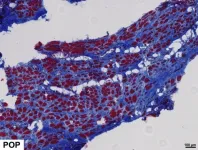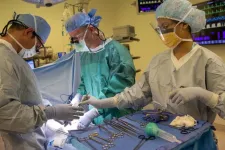(Press-News.org) In a study involving more than 500 people, participants correctly identified speech deepfakes only 73 percent of the time, and efforts to train participants to detect deepfakes had minimal effects. Kimberly Mai and colleagues at University College London, UK, presented these findings in the open-access journal PLOS ONE on August 2, 2023.
Speech deepfakes are synthetic voices produced by machine-learning models. Deepfakes may resemble a specific real person’s voice, or they may be unique. Tools for making speech deepfakes have recently improved, raising concerns about security threats. For instance, they have already been used to trick bankers into authorizing fraudulent money transfers. Research on detecting speech deepfakes has primarily focused on automated, machine-learning detection systems, but few studies have addressed humans’ detection abilities.
Therefore, Mai and colleagues asked 529 people to complete an online activity that involved identifying speech deepfakes among multiple audio clips of both real human voices and deepfakes. The study was run in both English and Mandarin, and some participants were provided with examples of speech deepfakes to help train their detection skills.
Participants correctly identified deepfakes 73 percent of the time. Training participants to recognize deepfakes helped only slightly. Because participants were aware that some of the clips would be deepfakes—and because the researchers did not use the most advanced speech synthesis technology—people in real-world scenarios would likely perform worse than the study participants.
English and Mandarin speakers showed similar detection rates, though when asked to describe the speech features they used for detection, English speakers more often referenced breathing, while Mandarin speakers more often referenced cadence, pacing between words, and fluency.
The researchers also found that participants’ individual-level detection capabilities were worse than that of top-performing automated detectors. However, when averaged at the crowd-level, participants performed about as well as automated detectors and better handled unknown conditions for which automated detectors may not have been directly trained.
Speech deepfakes are likely to only become more difficult to detect. Given their findings, the researchers conclude that training people to detect speech deepfakes is unrealistic, and efforts should focus on improving automated detectors. However, they suggest that crowdsourcing evaluations on potential deepfake speech is a reasonable mitigation for now.
The authors add: “The study finds that humans could only detect speech deepfakes 73% of the time, and performance was the same in English and Mandarin.”
#####
In your coverage please use this URL to provide access to the freely available article in PLOS ONE: https://journals.plos.org/plosone/article?id=10.1371/journal.pone.0285333
Citation: Mai KT, Bray S, Davies T, Griffin LD (2023) Warning: Humans cannot reliably detect speech deepfakes. PLoS ONE 18(5): e0285333. https://doi.org/10.1371/journal.pone.0285333
Author Countries: UK
Funding: KM and SB are supported by the Dawes Centre for Future Crime (https://www.ucl.ac.uk/future-crime/). KM is supported by EPSRC under grant EP/R513143/1 (https://www.ukri.org/councils/epsrc). SB is supported by EPSRC under grant EP/S022503/1. The funders had no role in study design, data collection and analysis, decision to publish, or preparation of the manuscript.
END
Speech deepfakes frequently fool humans, even after training on how to detect them
New study suggests improving automated detectors may be the best tactic to deal with speech deepfakes
2023-08-02
ELSE PRESS RELEASES FROM THIS DATE:
Neolithic necklace from child’s grave reveals complex ancient culture
2023-08-02
A single accessory – an ornate necklace from a child’s grave in ancient Jordan – provides new insights into social complexity of Neolithic culture, according to a study published August 2, 2023 in the open-access journal PLOS ONE by Hala Alarashi of the Consejo Superior de Investigaciones Científicas, Spain, and the Université Côte d’Azur, France and colleagues.
Body adornments are powerful symbols that communicate cultural values and personal identities, and they are therefore highly valuable in the study of ancient cultures. In this study, Alarashi and colleagues analyze materials that adorned ...
New insights on pelvic floor damage after vaginal birth, and new directions for treatment
2023-08-02
In the August 02, 2023 issue of Science Translational Medicine, University of California San Diego researchers lead a team that has published new insights on pelvic floor muscle (PFM) dysfunction, which is one of the key risk factors for pelvic floor disorders, a set of morbid conditions that include pelvic organ prolapse and urinary and fecal incontinence, that impact close to a quarter of women in the U.S. and have a strong association with vaginal childbirth. The work is part of a larger effort to advance understanding, treatment and prevention of pelvic floor muscle dysfunction in humans.
The ...
Humans unable to detect over a quarter of deepfake speech samples
2023-08-02
The study, published today in PLOS ONE, is the first to assess human ability to detect artificially generated speech in a language other than English.
Deepfakes are synthetic media intended to resemble a real person’s voice or appearance. They fall under the category of generative artificial intelligence (AI), a type of machine learning (ML) that trains an algorithm to learn the patterns and characteristics of a dataset, such as video or audio of a real person, so that it can reproduce original sound or imagery.
While early deepfake speech algorithms may have required thousands of samples of a person’s voice to be able ...
Study exposes plight of deported noncitizen veterans
2023-08-02
RIVERSIDE, Calif. -- A study examining the effects of deportation on the health and wellbeing of noncitizen veterans who served in the United States military has found that this group is a vulnerable and often unrecognized health disparity population.
Overseen by Ann Cheney, an associate professor of social medicine, population, and public health in the School of Medicine at the University of California, Riverside, the study reports the post-deportation economic, social, and political conditions of living abroad harm veterans’ physical and ...
Lockdowns create global appetite for feeding feathered friends
2023-08-02
A team of researchers have highlighted the role that the COVID-19 pandemic played in connecting people around the world more with our feathered friends while in lockdowns, finding a surge in interest for bird feeding information and providing more insight into global human-birds interactions.
Professor Emeritus Darryl Jones, from Griffith’s Centre for Planetary Health and Food Security, and the research team used Google search index (a valid proxy parameter from Google Trends data) and found a surge of interest in bird feeding in 115 countries after Covid-19 led to lockdowns where people stayed home.
Professor Jones, alongside lead author Associate Professor ...
Researchers discover a novel pathway that minimizes liver injury during transplantation
2023-08-02
UCLA-led research describes the role that a protein called CEACAM1 plays in protecting the liver from injury during the transplantation process, potentially improving transplant outcomes. But the features that regulate this protective characteristic remain unknown.
In a new study, to be published online Aug. 2 in Science Translational Medicine, a research team has identified the molecular factors at the root of this protection and shown how using molecular tools and alternative gene splicing can make CEACAM1 more protective, thus reducing organ injury and ultimately improving post-transplant outcomes.
Prior to transplantation, a solid organ, such as a liver, has no ...
UIC leads field study on home, water safety after Ohio chemical spill
2023-08-02
In February, the train derailment and subsequent chemical spill and fires in East Palestine, Ohio, caused an environmental emergency that led thousands of people to evacuate their homes. A multi-university study led by the University of Illinois Chicago will investigate the aftermath of that disaster, collecting data on the experiences of nearby residents and the effectiveness of communication from authorities about water, soil and air quality.
For the study, the researchers will conduct surveys and interviews with residents in and near East Palestine, including counties ...
MD Anderson research highlights for August 2, 2023
2023-08-02
HOUSTON ― The University of Texas MD Anderson Cancer Center’s Research Highlights showcases the latest breakthroughs in cancer care, research and prevention. These advances are made possible through seamless collaboration between MD Anderson’s world-leading clinicians and scientists, bringing discoveries from the lab to the clinic and back.
Recent developments include a novel biomarker that may predict the aggressiveness of pancreatic cancer precursors, insights into the structure and function of a breast and ovarian cancer susceptibility gene, a new approach to overcoming treatment resistance in ovarian cancer, distinguishing features of young-onset ...
August issues of American Psychiatric Association journals cover alcohol use disorder, interventions for PTSD and psychedelics in psychiatry
2023-08-02
The latest issues of three of the American Psychiatric Association’s journals, The American Journal of Psychiatry, Psychiatric Services and Focus are now available online.
The August issue of The American Journal of Psychiatry on the neurodevelopmental origins of psychopathology is focused on early-life adversity and genetics as mediators of the risk to develop psychiatric illnesses. Highlights include:
Overview of Alcohol Use Disorder.
A Comprehensive Multilevel Analysis of the Bucharest Early Intervention Project: Causal Effects on Recovery from Early Severe Deprivation. ...
Eyewitnesses to Arctic Change
2023-08-02
On Thursday, 3 August 2023, the research vessel Polarstern is scheduled to set off from Tromsø, Norway, towards the North Pole. For two months, a good fifty scientific expedition participants will explore the Arctic in transition as sea ice extent reaches its annual minimum in September. They will explore the biology, chemistry and physics of sea ice as well as the effects of sea ice retreat on the entire ocean system from the surface to the deep sea. Eleven years ago, Antje Boetius was part of the largest ever sea ice minumum in the Arctic ...
LAST 30 PRESS RELEASES:
GLP-1 drugs associated with reduced need for emergency care for migraine
New knowledge on heritability paves the way for better treatment of people with chronic inflammatory bowel disease
Under the Lens: Microbiologists Nicola Holden and Gil Domingue weigh in on the raw milk debate
Science reveals why you can’t resist a snack – even when you’re full
Kidney cancer study finds belzutifan plus pembrolizumab post-surgery helps patients at high risk for relapse stay cancer-free longer
Alkali cation effects in electrochemical carbon dioxide reduction
Test platforms for charging wireless cars now fit on a bench
$3 million NIH grant funds national study of Medicare Advantage’s benefit expansion into social supports
Amplified Sciences achieves CAP accreditation for cutting-edge diagnostic lab
Fred Hutch announces 12 recipients of the annual Harold M. Weintraub Graduate Student Award
Native forest litter helps rebuild soil life in post-mining landscapes
Mountain soils in arid regions may emit more greenhouse gas as climate shifts, new study finds
Pairing biochar with other soil amendments could unlock stronger gains in soil health
Why do we get a skip in our step when we’re happy? Thank dopamine
UC Irvine scientists uncover cellular mechanism behind muscle repair
Platform to map living brain noninvasively takes next big step
Stress-testing the Cascadia Subduction Zone reveals variability that could impact how earthquakes spread
We may be underestimating the true carbon cost of northern wildfires
Blood test predicts which bladder cancer patients may safely skip surgery
Kennesaw State's Vijay Anand honored as National Academy of Inventors Senior Member
Recovery from whaling reveals the role of age in Humpback reproduction
Can the canny tick help prevent disease like MS and cancer?
Newcomer children show lower rates of emergency department use for non‑urgent conditions, study finds
Cognitive and neuropsychiatric function in former American football players
From trash to climate tech: rubber gloves find new life as carbon capturers materials
A step towards needed treatments for hantaviruses in new molecular map
Boys are more motivated, while girls are more compassionate?
Study identifies opposing roles for IL6 and IL6R in long-term mortality
AI accurately spots medical disorder from privacy-conscious hand images
Transient Pauli blocking for broadband ultrafast optical switching
[Press-News.org] Speech deepfakes frequently fool humans, even after training on how to detect themNew study suggests improving automated detectors may be the best tactic to deal with speech deepfakes






